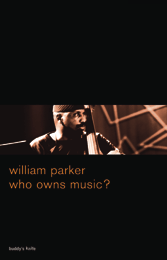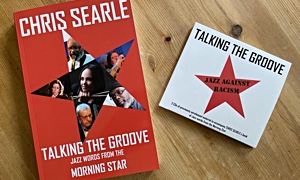Home » Jazz Articles » Book Review » Who Owns Music?
Who Owns Music?
 Who Owns Music?
Who Owns Music? William Parker
Soft cover; 140 pages
ISBN: 978-3-00-020141-7
Buddy's Knife
2007
Spirituality runs deep in the music and thinking of bassist William Parker. Those who have looked at the sleeves of his albums will have noticed that he not only expresses his philosophy in sound, but also through words, often including writings that are closer to poetry than the descriptions of music usually contained in liner notes.
So far, Parker's insights on life and music have appeared in scattered essays, liner notes, poems, journal entries and small chapbooks. Who Owns Music?, however, gives a comprehensive overview of Parker's writing and is the first book to do so. It provides a fascinating glimpse into the mind of one of the most important musical thinkers of the early 21st century.
Besides the informative foreword, written by the poet David Budbill, the book is divided into six parts: "listening to universe," "sound journal entries 1967-2006," "document humanum," "father of sound," "dreams" and "poems." The topics include everything from influential bassists to the educational system, the role of criticism, poverty, war and the death of Parker's father—but the common denominator is the quest to be a better human being through the realization of the power of music.
In Parker's philosophy, music isn't restricted to a particular sound or genre. It is, in a sense, the beating heart of the universe. "Music is a form of energy like the sun, " he writes. "Music is the voice through which spirits speak, using a language that is beyond words, a music that is beyond notes. Music informs us with a reality that is scented with the eternal."
While not everyone is equipped to take on the role and responsibility of a musical preacher, the positive message in Parker's book is that we are all open to the message of music—which is, in essence, the message of love. The world is often limited by exclusion while the way of the universe is inclusion. Parker expresses this point of view in one of his many telling aphorisms: "No race invented music."
Parker believes that music is misused the moment it is turned away from its true nature and becomes a tool for commerce and exclusion. Art loses its connection to beauty if it isn't the means to life, but instead the way to fame and fortune. This dilemma is expressed humorously in the following Parker aphorism: "The saxophonist says he no longer wants to scream on his horn; he no longer wants to be called an angry young man. In other words, he wants to make some money."
As a writer, Parker is able to combine humor and seriousness, politics and poetry, theory and praxis. It is hard to define the genre of the writing. He changes easily from polemical musings to condensed poetical meaning and the form morphs from free flowing, associative prose to near-scientific definitions, poetry, memorable one-liners and aphorisms. Like his music, Parker's words are larger than life and not meant to be placed in generic boxes. Instead, through words, he aims to open our eyes towards the mystery of life. Through it all, shines a message of hope: "Hope is eternal / it can never die / because it never lived / it is life itself."
Too many musical thinkers have written in a way that seems deliberately difficult. While Parker's art, whether in words or music, isn't always easy to understand, it strives for clarity, openness and inclusion—far beyond the obfuscating self-regard of the avant-garde scene, which too often regards itself as a closed community meant only for the initiated few. Parker's art addresses all humanity and especially those who are willing to hear. Its bottom line message is deep and uplifting: Music can really change our life if we let it.
Comments
Tags
For the Love of Jazz
 All About Jazz has been a pillar of jazz since 1995, championing it as an art form and, more importantly, supporting the musicians who create it. Our enduring commitment has made "AAJ" one of the most culturally important websites of its kind, read by hundreds of thousands of fans, musicians and industry figures every month.
All About Jazz has been a pillar of jazz since 1995, championing it as an art form and, more importantly, supporting the musicians who create it. Our enduring commitment has made "AAJ" one of the most culturally important websites of its kind, read by hundreds of thousands of fans, musicians and industry figures every month.






















